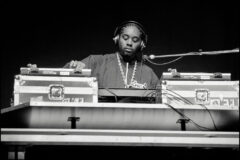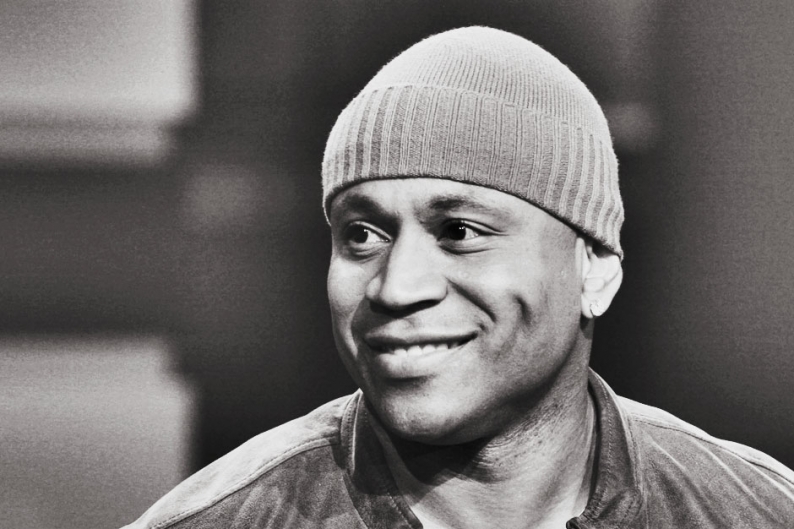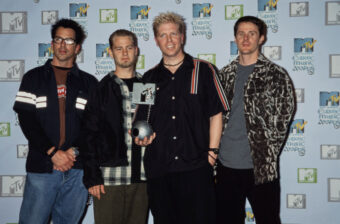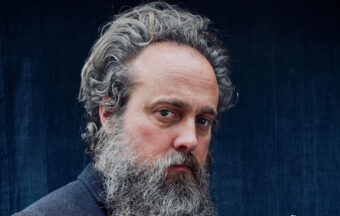There’s no blueprint for celebrating your 29th year in the rap game, so every year that LL Cool J is still making music, he’s technically breaking new ground. His list of achievements already shouts for itself — teenage Def Jam firestarter, love-jam innovator, battle-rap Ali, TV star, Grammy winner, Grammy host, and That Type of Guy. Today, with the release of his 14th album, Authentic, he can add “genre-smashing, major-label-contract-completing legacy” to the list — not to mention the first guy to get Eddie Van Halen on a rap record. Featuring experiments with Seal, Bootsy Collins, Earth, Wind and Fire, Fitz & the Tantrums, and, yes, Brad Paisley, Authentic is a testament to Cool J’s unique, inclusive vision, completely unencumbered by industry trends or label meddling.
Later this month, the MC will take a long-deserved, long-anticipated victory lap on the Kings of the Mic Tour with fellow icons Public Enemy, Ice Cube, and De La Soul. SPIN caught up with Uncle L, to rap about his rock tastes, his Def Jam woes, and, of course, “Accidental Racist.”
Your last U.S. tour was in 2008 with Janet Jackson…
You know what, I did a few dates with her but the last complete tour was ’96.
How are you preparing for the physical strain?
[Laughs] Let me tell you something — compared to a TV-drama production schedule, touring is not strenuous. [Laughs for a long time].

Also Read
GEAR THAT MADE THE GAME: Rap Machinery
What’s the most strenuous part of a TV schedule?
Let me just say that…I’m not a morning person. I’ve spent my whole life getting up late. So, for me, waking up at 4 or 5 in the morning every day is a little….I just like to sleep.
And touring you’re not getting onstage until…
Aha, now you’re seeing the light. Exactly. It’s a lot different. You’re traveling and it’s grueling in that regard. But it’s not like getting up at 4 and 5 in the morning. It’s more like going to sleep at 4 and 5 in the morning.
There’s definitely more strain on your body on a tour, though, right?
Well, on my show I’m jumping over cars, I’m fighting, I’m doing bazookas. I don’t want to give you the wrong impression — touring is not for the faint of heart. I don’t want to dismiss it like it’s so easy. But you do get some downtime to get it together.
What are the differences between touring in 2013 as a grown-ass man and doing, say, the “Raising Hell” tour in ’86?
Well my audience grew with me, so it’s gonna be the same people. In ’86, I was 17 years old or something, it was off the hook. It’s a hard question to answer. Am I gonna be on groupie patrol? No. I don’t know if there is much of a difference. I was always about my craft. Even if people assume that it was something else, I’ve always been about my craft and about doing the best show I could possible do. I’m going on tour with people who I respect and people who are gonna be bringing it onstage every night. We can’t be out there playing games.
You’ve spent your whole career boasting that you were the “greatest rapper in the history of rap itself.” Do you feel like you might not be the greatest?
What I say on a record and what I say off a record is two different things. And that’s always been the case. There’s a difference between confidence on a record and arrogance. So I’m human like everyone else. But the flipside is that I have to give myself some credit. I’m doing an interview about going on tour almost 30 years after I started? Is there another rapper doing that? That’s relevant? I gotta give myself a little credit. My first single came out in 1984 and my new album’s coming out in 2013. Even the guys who are my age have only been out half as long.
Nobody really has maintained a steady career as long as you have.
But that’s why I go and I do an album and I get somebody like Seal and Eddie Van Halen and Earth, Wind, and Fire, and Charlie Wilson, and Bootsy Collins, and Tom Morello — because me doing that is a continuation of me growing. If I go out there and try to get every young current rapper that’s out there, it’s like I’m using a crutch, or I’m following. It’s like I’m trying to play catch-up. And for me, it’s about moving forward… It’s wonderful to think, oh yeah, I’m the 19-year-olds’ favorite forever. But that’s not a reality when you do something for 30 years. You gotta be comfortable with who you are. My man Quincy Jones always told me, “You can’t make music that’s more or less than you are as a human being.” I’m doing what I do for real. I’m being true to who I am. And I think that when you’re true to who you are, people can relate. We shouldn’t all of a sudden throw all of the rules out that apply to rock’n’roll and jazz and country so that in hip-hop we have to be disposable pop artists once we pass the teenage stuff. To me, my peers are Bruce Springsteen and Mick Jagger. I’m not talking age-wise, but in terms of careers. Madonna. Those are my peers. And I’m okay with that.
You have a lot of rock musicians on the album. Do you have any favorite rock records right now?
I love all kinds of rock music, man. I’m strange, I go back to Jimi Hendrix and [sings a line from “Red House”]. That last Hendrix album that his estate released, I like a lot of the bluesy stuff on that.
Would you have been allowed to make this record on Def Jam?
No.
Can you give an example of why?
I did a song with the Red Hot Chili Peppers, which was on the Howard Stern soundtrack [“I Make My Own Rules”]. But Def Jam didn’t even want my name on the label copy, they were so afraid of me like that, different like that. And me and Rick Rubin went and worked really hard on that song, and we liked it, we thought it was good, but they just didn’t want me to be a part of that and really jump in the lane. Now I don’t have those issues. It may be for good reason. There are probably people out there who said they needed to reel you in, but you know what, I’m an artist. Art is about imagination. When you look at a picture from Salvador Dali, that’s about imagination. When you look at Picasso, that’s about imagination. Doing stuff from your heart. No, I’m not Salvador Dali. I’m LL, but I can still use my imagination.
How have you been dealing with the fallout from “Accidental Racist”?
Some people connect the dots and some people don’t, but at the end of the day, love conquers all. You look at the movie 42. It’s no different. You can look at the movie 42 and listen to the record and draw all kinds of parallels. Anybody who doesn’t want to see that we were talking about love, and anybody who takes it literally just because they want to take it literally, misses the point. I can’t begrudge people who feel a lot of pain in their lives over different things that aren’t even related to me. If they lash out, I just have to chalk it up as, “They didn’t get it, maybe they’ll get it later.” Sometimes it takes people a little longer to understand it. I don’t feel any kind of way about it. That’s what art is supposed to do. I’m not gonna get out here and be mad and be lashing out at people that are coming at me. They’re doing what they’re doing because at their current level of understanding, that’s how they see it.
What do you think people are missing?
I think people are missing the point that what I’m saying is “Everybody is not a racist.” Every redneck southerner is not a racist. Every person who’s down South is not a racist. Some people are missing that point. I think that, without going too in-depth, people are missing the point that when I said “do-rag,” I could easily have said “hoodie” and look at what happened with Trayvon Martin, people saying he’s suspicious because he’s a black man with a hoodie. The hoodie has nothing to do with the confederate flag. It doesn’t have the same level to us as the confederate flag in terms of the history and the rapes and the torture. When you look at the lives that have been lost over those do-rags in the city, all of a sudden you can see what I’m saying. And for some reason, you have people who want to catch convenient amnesia and forget that black men get judged on their clothing in this current world. I don’t know why people are acting like they don’t remember that.
I think people are upset at the idea that judging a black man by his clothing is nothing like judging a white person for wearing a symbol of oppression.
But here’s the problem. When that black man is being killed because of that, it’s not about whether it’s so much more or not so much more. It’s about whether the person is alive. It’s about Trayvon Martin being alive. It’s not about is it right or wrong. It’s about him being alive. What are we gonna do? We have million hoodie marches and now all of a sudden we don’t realize the importance of clothing in the African-American community? We don’t know what clothing means now? We forgot that? What I was saying is, if I could arrange it that people could stop being judged for those reasons and stop being killed for those reasons and stop being arrested and wrongfully imprisoned for that clothing, then that’s something to think about. I would be willing to sacrifice some of those symbols for peace today. People don’t want to give up the anger over the past for peace today. If you think about it, that’s the thing that has the whole entire world in war. It’s very simple. “I’m not gonna give up my anger over the past in order to have peace today.” That’s all it boils down to. When I was writing that letter in that song to that imaginary white man who was talking to me, people missed what I said in the song. I said “I feel like a newfangled Django dodging invisible white hoods.” What black man that’s been out here in the job market cannot relate to that? Invisible white hoods? You don’t get that?
People were definitely latching on to one or two lines…
But they were latching on to lines and taking them literally instead of connecting the dots. When I say, “If you don’t judge my gold chains, I’ll forget the iron chains,” I’m not lessening the weight and severity. I’m not trying to trivialize slavery, that would be horrifying. I might as well be a serial killer. But what I am saying is that, okay, those things happened, but instead of me walking around being bitter about the past, my thing is this: Don’t run up on me about being a crack dealer or pull me over and illegally search me just based on my appearance. Judge me by the content of my character, not the color of my skin. Not my hoodie. Not my do-rag. That’s how we find peace. You’re asking me not to be angry about the past, and I’m saying, I’m willing to not be angry about the past if we can have some sort of equality in the present. And I don’t understand how this is disrespectful. I just don’t see the disrespect in that. It’s almost like some people had such a knee-jerk reaction to what I was saying that they didn’t even take the time to connect the dots. How are we gonna have peace if everybody is angry about the past and everybody is hyper-sensitive about our current symbols? We can’t have any peace, any true peace. That’s all I’m saying. And I’m not saying I have all the solutions, I’m not saying the song is perfect, I was just trying to raise a conversation and raise the idea that maybe forgiveness and love isn’t a bad idea. And I don’t think that a song that’s talking about tolerance, forgiveness, and love is the worst song ever made. I think it’s probably the opposite. You have some people who ridicule. But they just missed the point.
Do you think time will bear that out?
Of course, it will. Come on, man, look at how terrible Boston was. And what happens in the middle of Boston? You see this Latino guy, I don’t know if he was an immigrant or not, he’s in a cowboy hat helping people. If symbols weren’t important…you see the truth in what I’m saying? And I’m not saying these symbols aren’t important. What I’m saying is that you gotta start somewhere. And there are some southern people who are not racist and are not looking to hurt African-Americans or anybody else for that matter, but they do have a certain amount of southern pride just based on where they’re from, just like anybody else. What about the black guys who are proud to be from the south? I hope that’s not a negative. I think actions speak louder than words, so my album is super-inclusive. It’s got everybody from Eddie Van Halen to Fitz & the Tantrums because, to me, I’m not gonna be forced into not participating with people and not inviting them into what I’m doing. What I create is for everyone. I was put on by a white Jewish guy, Rick Rubin. My music is for everybody. And I’m not gonna back down from that stance. And for those who can’t appreciate that, oh well.




